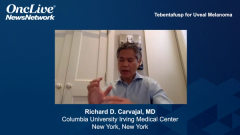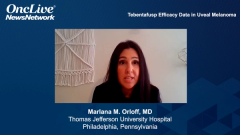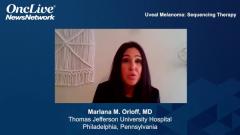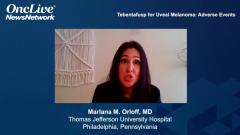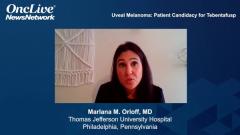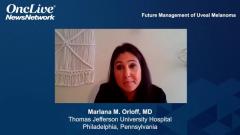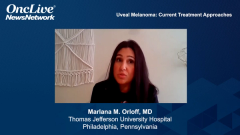
Uveal Melanoma: Patient Candidacy for Tebentafusp
Drs Richard D. Carvajal and Marlana M. Orloff highlight variables that should be considered when assessing the appropriateness for treating patients with uveal melanoma with tebentafusp.
Episodes in this series

Richard D. Carvajal, MD: We have the 202 [IMCgp100-202] study, which was basically untreated patients, a clear survival advantage. We have the 102 [IMCgp100-102 study] trial, where it’s a single-arm trial, but overall survival looks good compared to historical controls. Who are the patients you’re going to treat, and are there any patients who are HLA [human leukocyte antigen] eligible who you might not treat with tebentafusp?
Marlana M. Orloff, MD: No. 1, we screen all our especially high-risk patients, the patients who are not yet metastatic but at least high-risk primary. They have their primary eye tumor treated, and then either by size of primary eye tumor or genetic risk profile, they are deemed to be at high risk of recurrence. We check HLA on everyone just so we have that information because once the patient has that first scan that shows a new lesion, you want to have plan out of the gate. This is likely going to be a good first-line option for all HLA-positive patients. The potential problem is the logistics. There are some patients for whom weekly treatment for whatever reason is not going to be feasible. For those patients, we may need to figure out something else. Because this is a rare cancer, I know you too, we see patients from all over the country and patients who come from all different types of backgrounds and means, and getting weekly treatment can be a lot. The interesting thing though, unlike immune checkpoint inhibition where you worry about baseline autoimmune disease and exacerbating that, obviously there haven’t been any studies yet with tebentafusp. But you could see though that even if someone has an autoimmune disease, because this is so specific, outside of that initial cytokine release general immune stimulation, we may be better set up to treat those kinds of patients just because of the specificity of this drug. I don’t know if you have thoughts about that.
Richard D. Carvajal, MD: The only thing I would think about is, we’re very careful with surveillance, and we tend to catch patients when they have got low volume recurrence. But in the patient population with significant disease within the liver, I wonder if those patients may benefit from maybe a regional therapy first. I say that because if you look at the data from the 202 trial, the patients who had normal LDH [lactate dehydrogenase], low tumor burden, they are the ones who clearly had the benefit, whereas the hazard ratio crossed 0 for the M1c patients, the larger tumor burden patients. The benefit may be the greatest in the lower tumor burden patients.
Marlana M. Orloff, MD: Fortunately, like I said it’s not many patients who come to us with greater than 50% of their liver involved out of the gate, but they do exist. I agree, coming from an institution where we do a lot of liver-directed therapy, we always do like to control people’s livers before we get them on some sort of systemic therapy, especially if this drug takes a little while to work. I don’t remember if it was patients you treated, but there were some patients who had significant hepatic disease early on in the 102 study, and they also had some more of the toxicity. In 102 ultimately, there was a bit of a change where we weren’t treating patients with greater than 50% of their liver involved just because of concern about some of the [adverse] effects. You are right, that may be a subset of patients for whom we want to control their liver first, and if we can control their liver, then potentially looking at tebentafusp.
TRANSCRIPT EDITED FOR CLARITY


